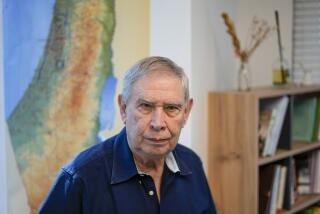Premier Defends Plan for East German Police
- Share via
EAST BERLIN — East German Prime Minister Hans Modrow on Thursday defended his plan for a new internal security force and tried to quell growing dissent by indicating that the opposition could have a part in his government.
Thousands of people formed a human chain around Parliament after Modrow’s speech to lawmakers, and a non-Communist partner in the coalition government repeated threats to quit the Cabinet.
An independent trade union movement threatened to call a nationwide strike Jan. 25 if Modrow fails to prove that the secret police force has been dissolved.
In a speech to Parliament, Modrow defended his authority and appealed for national unity to fight the economic and political problems threatening his shaky government, which came to power with the rise of the pro-democracy movement.
“I cannot recall becoming premier through a coup,” he said.
Modrow did not rule out the resignation of his transitional government for “compelling reasons” but said he expects it to last until nationwide elections planned for May 6.
During the meeting, Parliament dismissed the state security chief, Lt. Gen. Wolfgang Schwanitz, whose agency the government promised last month to dissolve. The hated secret police, known as Stasi, used repressive measures to help ensure 40 years of Communist control.
Government officials say that about 26,000 of the 85,000 state security employees have been taken off the payroll. Opposition groups want guarantees that the force will be disarmed and assurances that former agents will not have a part in a new agency.
Modrow said “the aim is not to maintain the old structure” of state security.
But he told Parliament that “there cannot be a security vacuum,” and cited violence by neo-Nazi groups as well as “terrorism, drugs and ecological crime.”
Modrow urged the opposition to make suggestions about how it would be prepared to “participate directly and responsibly in the work of the government with competent personalities.” But he did not say when or how such participation could take place.
For the first time, opposition members sat as observers in Thursday’s Parliament session.
More to Read
Sign up for Essential California
The most important California stories and recommendations in your inbox every morning.
You may occasionally receive promotional content from the Los Angeles Times.










